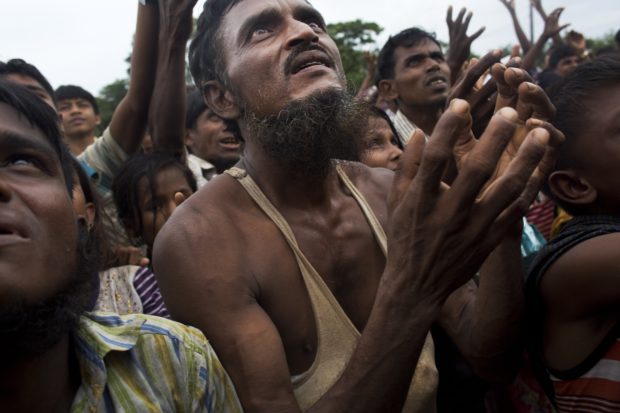Food supply gets more challenging for Myanmar refugees

A Rohingya man stretches his arms out for food distributed by local volunteers, with bags of puffed rice stuffed into his vest at Kutupalong, Bangladesh, Saturday, Sept. 9, 2017. With Rohingya refugees still flooding across the border from Myanmar, those packed into camps and makeshift settlements in Bangladesh are becoming desperate for scant basic resources and dwindling supplies. Fights are erupting over food and water. Women and children are tapping on car windows or tugging at the clothes of passing reporters while rubbing their bellies and begging for food. AP
UN food agency sees tough days ahead as it struggles to raise funds for continuing food support for over 800,000 Rohingyas amid conflicts in various parts of the world.
“We are knocking at the donors’ doors on a daily basis. But there are so many emergencies in this world,” said Christa Rader, country director of World Food Programme (WFP) in Bangladesh.
Of the US$77 million sought by WFP for six months until February 2018, the international community has confirmed only US$22 million and pledged US$24 million more.
The WFP call is part of the UN appeal for US$434 million, and donors have so far pledged US$ 344 million in total.
“We hope towards the end of this year some donors will commit some money for the Rohingyas if some money is left over,” she said in an exclusive interview with The Daily Star at the UN office in the capital on November 7.
Article continues after this advertisementShe sought more generosity from the international community for the Rohingyas who fled violence in Myanmar and are now in a vulnerable state.
Article continues after this advertisementRader, however, says it is not feasible for the donors to continue funding the large number of Rohingyas for an indefinite period and suggested that some of them make their own living.
The male members of the community can be engaged in establishing the camps in Balukhali of Ukhia, where the Bangladesh government has allocated 3000 acres of land, she said.
Rader said they can also be trained and engaged in producing items needed by the community such as soaps, fuel and stoves.
They could also produce goods, including handicrafts, which can be sold in other parts of the country. However, the private sector needs to come forward if that is to happen, she said.
“I think this will be a win-win situation for Bangladesh and the refugees,” the UN official said.
Asked if this would lead to competition in the labour market between the locals and the Rohingyas, especially given the high unemployment rate in Bangladesh, Rader said it was not unlikely.
“But, what to do? This is a dilemma. If some of the refugees are not allowed to make their own living, they would starve… simply starve.”
The WFP presently provides 50 kgs of rice, nine kgs of lentils and yellow split peas, and 4 litres of vegetable oil per month for over one lakh households each.
It also provides rice to Action Against Hunger, which in turn prepares hot meals for the new arrivals. New arrivals are also provided with fortified biscuits. The UN Food Agency further provides super cereal food for children under five, pregnant and lactating mothers.
The total cost per month for food support is US$12.83 million, WFP said.
Rader said as there is a shortage of funds, WFP would focus on the most vulnerable people — small children, nursing women and school-going children — by providing diversified food through electronic vouchers.
“This will be our focus; not trying to feed a million who could be partially brought into productive jobs,” she said.
Mohammad Habibul Kabir Chowdhury, head of Rohingya cell at the Ministry of Disaster Management and Relief, however, said the government has put restrictions on recruitment of the Rohingyas by any Bangladeshi employer as many people in Cox’s Bazar are already jobless.
“We have no plan to engage the Rohingyas in any jobs,” he told this correspondent.